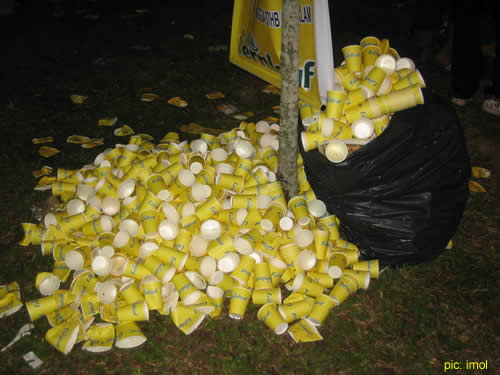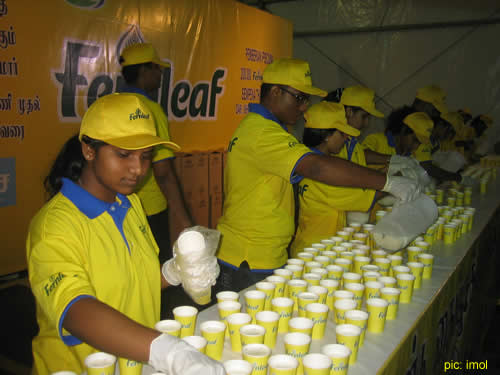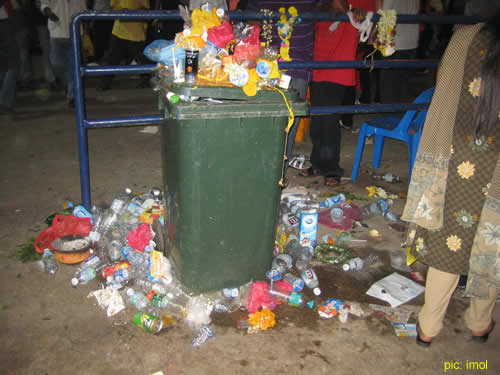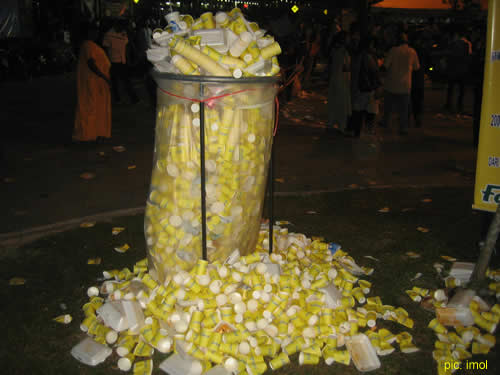
We hardly know each other
|
Dynastic politics rule the day – across South Asia as well
Mayawati, the chief minister of Uttar Pradesh, India’s most populous
state with 200 million people, has often ridiculed Congress general
secretary Rahul Gandhi, calling him yuvaraj, Hindi for `prince’. The
waspish reference is to the 41-year-old’s bloodline -- the Nehru-Gandhi
lineage that has dominated the Indian political matrix for over five
generations.
That is despite the fact that the 56-year-old Mayawati, who publicly
professes anathema for dynastic politics, has herself fielded more kin
and friends of her party -- the Bahujan Samaj Party or BSP -- than
Congress itself. Many of her favored ministers’ relatives occupy high
positions within the state
As the electoral battle in Uttar Pradesh, which goes to the polls in a
series of staggered elections starting tomorrow -- gets increasingly
clamorous, Rahul, son of the ruling UPA Chairperson Sonia Gandhi, and
the Congress party’s future prime ministerial candidate, will be facing
more such barbs spotlighting the politics of inheritance in the world’s
largest democracy.
But the lottery of birth has become a serious determinant of political
fortunes in India to the point where the country is often referred to as
"a democracy of dynasties, for dynasties and by dynasties". The Gandhi
family should know. It is probably the world's oldest democratic
dynasty, producing a team of grandfather-daughter-grandson prime
ministers that has ruled India for 37 of its 65 years as an independent
state.
However, to be fair to the Gandhis and Mayawati, nepotism is well
entrenched in the other Indian political parties as well, both at the
state and national level. This fact has become more evident as five
Indian states – UP, Goa, Punjab, Uttarakhand and Manipur – head for
assembly polls this month.
The culture of dynastic politics permeates other political parties as
well. Ramji Suman, Samajwadi Party (SP) general secretary for instance,
has procured a ticket for his son Ranjeet Singh from Jalesar in Etah
while jailed former minister Amarmani Tripathi’s son Amanmani is the SP
candidate from Nautanwa in Maharajganj district.
The culture of nepotism is prevalent within the country’s largest
opposition party, the Hindu fundamentalist Bhartiya Janata Party, as
well. Here, Lalji Tandon, party MP from Lucknow, one of the most
significant political constituencies in the country, has secured a party
ticket for his son Ashutosh Tandon from Lucknow North. Raj Kishore
Verma, son- in- law of BJP spokesperson Ramnath Kovid, is a party
candidate from Balamau in Hardoi. BJP MP Ramakant Yadav’s wife Ranjana
Yadav is contesting from Nizamabad and his son Arun Yadav from Jalalpur
In India’s richest state of Punjab, dominated by the feudal Jat culture,
politics has been a family affair since independence in 1947. Here, six
powerful clans have presided over the state’s political fortunes. These
include wealthy, landed Jat families like the Patiala Royals, Badals of
Muktsar, Majithias of Amritsar, Kairons of Tarn Taran, Brars of Sarai
Naga and Manns of Sangrur.
“Elections are merely a process of temporarily shifting the balance of
power from one clan to the other. Inter-clan marriages have spawned
political havens that ensure that no family is ever completely out of
power,” wrote Asit Jolly in India Today magazine.
Analysts say fielding the kin of party veterans gained momentum during
2009 Lok Sabha (lower house) elections when relatives of several leaders
from across the political spectrum jumped into the fray.
“The dynastic equation serves everybody well,” said sociologist Dr.
Ashit Basu of Kolkata University. “The political party can cash in on a
brand name while capitalizing on the political capital invested by the
family in the state’s administrative/PR machinery. The electorate also
seems to be more at ease with a candidate whose ancestors have been
familiar faces in the political arena.”
It should be pointed out tht India is far from alone. American scholar
Stephen Hess, who wrote America's Political Dynasties, talked of
American political dynasties coming "in all sizes and flavors." Access
to the political system in most countries is costly in terms of money
and only those who can afford the time, money, resources and have the
requisite connections find an entry into what is often “an exclusive, if
not closed club”. “Political lineage buttressed by money helps
facilitate that entry,” Hess wrote.
Democratic purists would do well to remember that such blatant
partisanship exists all over the world. South Asia has been perhaps the
most famous for such dynasties. Pakistan, India, Bangladesh, Sri Lanka
and Nepal all have well-entrenched traditions. In Nepal, after the
massacre of the entire royal family at the turn of the century, the
king's brother took over. Prime Minister G.P. Koirala's two other
brothers were prime ministers as well — the only instance of three
brothers serving in such high elective office.
In Sri Lanka, Prime Minister Solomon Bandranaike's widow, Sirimavo
Bandranaike, became prime minister followed by her daughter, Chandrika
Kumaratunga as president. Bangladesh too, has seen two redoubtable women
rule -- Sheikh Hasina, daughter of erstwhile President Mujibur Rahman,
and Khaleda Zia, widow of President Ziaur Rahman.
In Pakistan, Zulfikar Ali Bhutto was prime minister during 1971- 1977
while his daughter Benazir was elected for two stints during the 1990s,
the first woman from a Muslim state to head a government. In the
Philippines, families have dominated politics for decades. Aung San Suu
Kyi in Burma, Megawati Sukarnoputri in Indonesia, Peron of Argentina,
Hafez al Assad in Syria, Kim Il-Sung are some other examples from this
near-monarchical tradition.
The election of George W. Bush as president eight years after his father
left the White House, and Makiko Tanaka's induction as Japan's foreign
minister some 25 years after her father was premier, prove that the
First World isn’t immune. Although the Kennedys were the most famous
Western political dynasty, the Bush election was the second instance in
American history of a father-son presidency.
In fact dynastic participation in the world’s oldest democracy is quite
common in American state and local politics. Former U.S. vice president
Al Gore’s father was a senator while Chicago Mayor Richard Daley's son
was a Cabinet official under Clinton and campaign manager for Gore.
As far as India is concerned, experts are hopeful that as Indians get
increasingly enlightened about their democratic rights, they will hold
their government accountable over corruption, economic performance,
social benefits etc. “In such a scenario, bloodlines will matter less
and will eventually pave way for something more openly contested and
democratic,” predicts Basu.
Till then, however, Indian political candidates will continue to flex their dynastic muscle.
(Neeta Lal is a New Delhi-based senior journalist;
neetalal@hotmail.com.)
 The death toll from yesterday’s attack by the Misrata brigade on a refugee camp in Tripoli has reached 12.
The death toll from yesterday’s attack by the Misrata brigade on a refugee camp in Tripoli has reached 12.




 Pix by Fahirul N. Ramli
Pix by Fahirul N. Ramli





